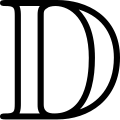Domain of discourse In the formal sciences, the domain of discourse or universe of discourse (borrowing from the mathematical concept of universe) is the set of entities over which certain variables of interest in some formal treatment may range. It is also defined as the collection of objects being discussed in a specific discourse. In model-theoretical semantics, a universe of discourse is the set of entities that a model is based on. The domain of discourse is usually identified in the preliminaries, so that there is no need in the further treatment to specify each time the range of the relevant variables.[1] Many logicians distinguish, sometimes only tacitly, between the domain of a science and the universe of discourse of a formalization of the science.[2] EtymologyThe concept universe of discourse was used for the first time by George Boole (1854) on page 42 of his Laws of Thought:
The concept, probably discovered independently by Boole in 1847, played a crucial role in his philosophy of logic especially in his principle of wholistic reference. Alfred North Whitehead cited Augustus De Morgan as identifying "that limited class of things which is the special subject of discourse on any particular occasion. Such a class was called by De Morgan, the Universe of Discourse."[4] Lewis Carroll expressed the need for a universe of discourse as follows:
ExamplesFor example, in an interpretation of first-order logic, the domain of discourse is the set of individuals over which the quantifiers range. A proposition such as ∀x (x2 ≠ 2) is ambiguous if no domain of discourse has been identified. In one interpretation, the domain of discourse could be the set of real numbers; in another interpretation, it could be the set of natural numbers. If the domain of discourse is the set of real numbers, the proposition is false, with x = √2 as counterexample; if the domain is the set of natural numbers, the proposition is true, since 2 is not the square of any natural number. The binary relation called set membership, expressed as , and meaning that x belongs to set A, is clear enough. Every binary relation has a converse relation, and the converse of . Also, a binary relation must have a domain. The domain of the converse of set membership is the universe of discourse. Any subset of this universe may, or may not, contain x. A is a subset of this universe, not necessarily restricted to A. See alsoLook up domain of discourse in Wiktionary, the free dictionary.
References
|
Portal di Ensiklopedia Dunia















